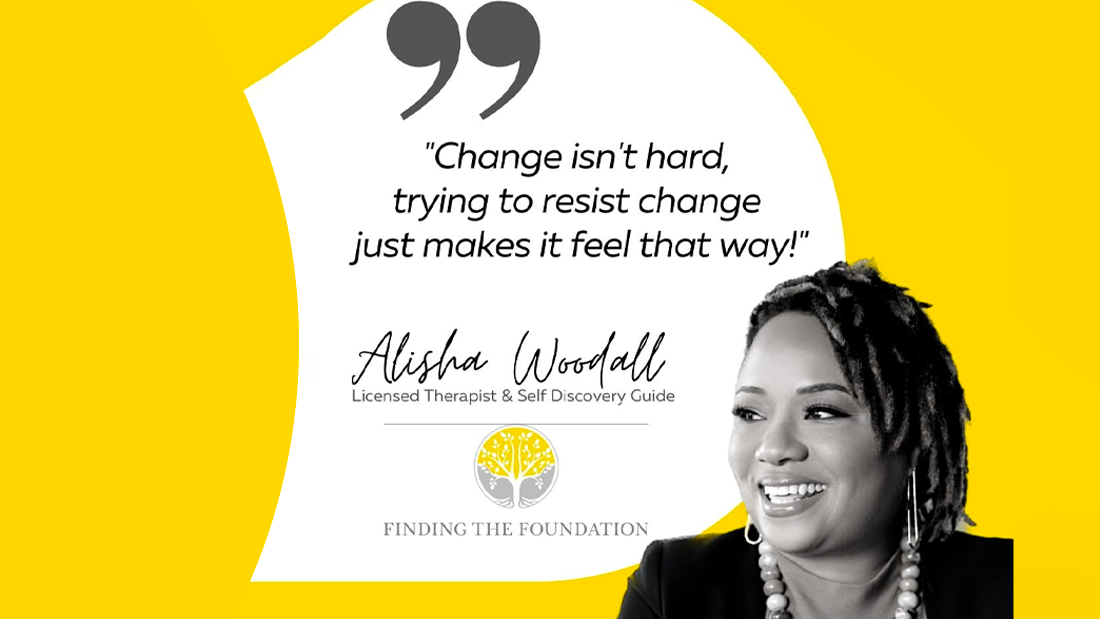Digging Deeper
with Alisha

Change
Lately I’ve been talking a lot about change with my clients and though each of them are dealing with different types of change, the one thing that they all seem to have in common is this subconscious belief that change is hard!!! They, like many others, have always been told that change is difficult and throughout their lives wrestled with a variety of different types of painful change. It’s safe to say that Change has been typecast as a menace, designed to seek and destroy good hearted people who simply desire for everything to remain the same.
As I listened to clients tell me how much pain change was putting them through, I couldn’t help but wonder “what if change wasn’t really at fault for the pain?!” What if change was simply natural order and we were the ones responsible for making it out to be hard? What if change just was? I mean sure, life changes aren’t fun and more often than not they show up unexpectedly with a barrel of new things you must adapt to without warning. Sometimes it super sucks, especially when you don’t want the new things that change is insisting that you embrace.
I pondered various times in my own life where change had presented itself and essentially left me with only 3 choices: Ignore change, fight change or embrace change! Ignoring change felt like it was helpful, but only because I wasn’t actually facing the change and tended to only prolong inevitable emotional distress.
Fighting change felt brave at the time, like I was standing up boldly for my right to maintain the same- but in the end change always prevailed and I was left exhausted, emotionally drained and defeated!
It was only through the embracement of change that I felt less tattered and torn, I realized that fighting and ignoring change always left noticeable scars with lasting damage to my heart and mind, yet embracing change felt empowering and allowed me to receive new things with an open mind.
What I’ve gathered from years of helping individuals deal with change is that one of 2 things (if not both) are typically present when change is perceived as being “hard” : 1) Obsession with the past and / or 2) Fear of the future. It’s not the actual change that causes the discomfort; it’s the unwillingness to accept something different than what you currently have, because what you have you’ve had for so long that you can’t imagine not having it! READ THAT LINE TWICE
Knuckles clenched tight, it’s the inability to release and let go that causes proverbial rope burns on our hands and our hearts. In relationships it sometimes sounds like “…but we’ve been together for so long and invested so much!” or at jobs that you hate, it looks like complaining daily without executing an exit plan and actually leaving.
Being obsessed with the past prevents you from appreciating what is happening in the now and being fearful of the future forces you to be stagnant, interfering with the natural evolution of self; neither provide the internal peace produced when you choose to embrace what you cannot prevent.
When working with individuals on resistance of change, one of the first things I establish is their fears; they have to identify what is holding them back in order to understand how they can move forward. Often times, the fears are blanketed in reasonable rationales designed to keep the individual safe; safe from movement, safe from growth, safe from discomfort; and while this resistance to change appears to be keeping them safe, it is also producing space for ongoing agony and pending emotional pain. It’s like that old saying goes ” You can either go against the tide and tire your legs or swim with the tide and let it take you where it wants you to go.”
I would never suggest that all changes are easy or negate how uncomfortable unwanted changes can be; it’s completely normal to desire consistency and familiarity in your life! That said, change happens and when it does, it’s important to keep in mind that you really only have two choices: Embrace or resist; either way, change is happening and only you are in control of how you will experience it.



